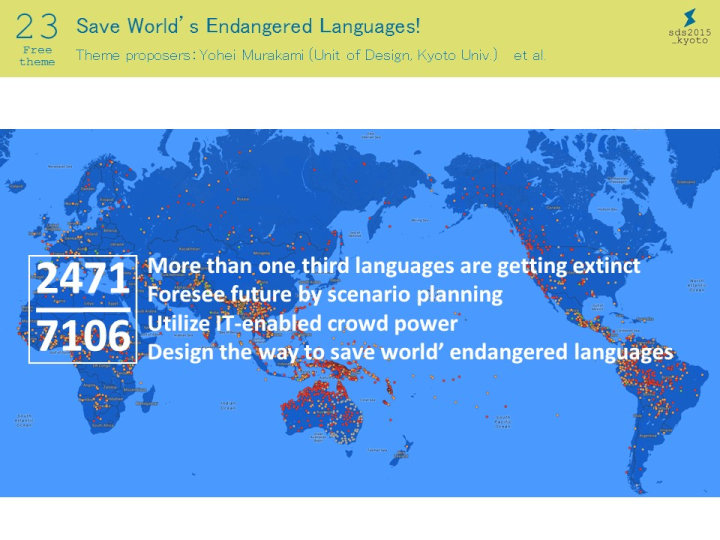Theme Descriptions
23 Save World's Endangered Languages!
We are facing the danger where half languages become extinct without any measures. It is true that conserving species is important, but the species would not be even recognized without the words representing the species. Let’s save world’s endangered languages by your flexible idea.
Organizers
| Name | Organization | Specialty |
|---|---|---|
| Yohei Murakami | Unit of Design, Kyoto University | Service Computing, Artificial Intelligence |
| Arbi Haza Nasution | Department of Social Informatics, Kyoto University | Web Service |
| Toru Ishida | Department of Social Informatics, Kyoto University | Artificial Intelligence, Intercultural Collaboration |
Overview
There are more than 7000 languages around the world. However, 95% of world population speak only 5% of them, at most 400 languages. More than half languages have less than 10,000 speakers. In 2010, UNESCO surveyed endangered languages all over the world and announced that about 2,500 languages were classified into endangered languages. To preserve these endangered languages, linguists have led trial activities to describe basic syntax and vocabularies, record texts, voices, and movies, and archive the recorded data.
This workshop focuses on ethnic languages in Indonesia as a case study, and try to create the IT-enabled sustainable way to preserve the endangered languages. To this end, participants should take account of education policies in Indonesia and demographics of the ethnic languages speakers. Also, they need to consider how the dissemination of new technologies like smartphones and SNS affect the ethnic languages, and how social values are changing. Through the workshop, the participants clarify factors that affect the ethnic languages, extract several scenarios based on the factors, and predict what kind of future is coming. Moreover, they try to find potential problems to preserve the endangered languages through fieldwork, where they have interviews with Indonesian ethnic language speakers to survey how the role of the ethnic languages is changing.
Finally, the participants design the way to preserve the endangered languages through brainstorming, and validate it based on several created future scenario.
This workshop focuses on ethnic languages in Indonesia as a case study, and try to create the IT-enabled sustainable way to preserve the endangered languages. To this end, participants should take account of education policies in Indonesia and demographics of the ethnic languages speakers. Also, they need to consider how the dissemination of new technologies like smartphones and SNS affect the ethnic languages, and how social values are changing. Through the workshop, the participants clarify factors that affect the ethnic languages, extract several scenarios based on the factors, and predict what kind of future is coming. Moreover, they try to find potential problems to preserve the endangered languages through fieldwork, where they have interviews with Indonesian ethnic language speakers to survey how the role of the ethnic languages is changing.
Finally, the participants design the way to preserve the endangered languages through brainstorming, and validate it based on several created future scenario.
Educational Goals
This workshop plans to find and solve problems related to endangered languages by using scenario planning. The participants learn how to lead a concrete design solution from the possible scenario made by popular media scan and interview survey. The key is whether they can create various possible future scenario based on known facts.
Design Theory and Design Method
This workshop plans to find and solve problems based on scenario planning. To make scenarios, the participants have interviews with Indonesian ethnic language speakers as fieldwork, and try to extract predictable trends and unpredictable uncertainties. Furthermore, they learn design methods through practices by referring to 101 Design Methods (WILEY, 2013)
Schedule
Day 1: Sept 16
Morning
- Explain main purpose of this theme
- Survey statistic data about Indonesia and information related to Indonesian ethnic languages on the Web to grasp real problems in Indonesia
- Make a list of questions for interview based on the survey results
Afternoon(1)
- Fieldwork: have interviews with Indonesian ethnic language speakers, who are Indonesian exchange students in Kyoto university, to obtain insights
Afternoon(2)
- Frame insights obtained from Web and the interview
Day 2: Sept 17
Morning
- Classify insights obtained on the first day into predictable trends and unpredictable uncertainties, and create several possible future scenarios by combining the trends and uncertainties
Afternoon(1)
- Ideate ways that control the uncertainties to avoid undesirable scenarios and that solve problems caused by the undesirable scenarios
- Forcedly ideate solutions by combinig perspectives extracted from the ideas
Afternoon(2)
- Concretize the idea using a storyboard and concept sketches
- Prepare final presentation
Day 3: Sept 18
Morning
- Preparation for presentation.
Afternoon
- Presentation
